We’re All Immigrants
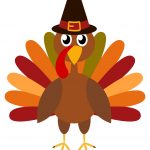
As a genealogist, and as a U.S. citizen living in politically stressful times, I think about immigrants kind of a lot. Especially around Thanksgiving time, which is right now, as I write.
NOTE: If you do nothing else, scroll down and watch the powerful 5-minute video I have provided for you. Thanks!
The first Thanksgiving
The Pilgrims were pioneers. And colonists. And refugees. And immigrants — illegal immigrants.
Well, OK, there was no actual legal process to follow in those days. All they wanted was to escape religious persecution and live a better life. But it’s also not like the Indigenous people they encountered were holding up signs saying, “Give me your tired, your poor, your huddled masses yearning to breathe free.” Those words are from “The New Colossus”, a poem by Emma Lazarus, which was engraved on a bronze plaque on the pedestal of the Statue of Liberty more than 200 years after the Pilgrims landed at Plymouth. Also, I’m not calling it “Plymouth Rock” because, well, have you seen it? LOL!
The first Thanksgiving was (supposedly) all about welcoming and helping strangers, sharing foods and customs, and being grateful together. What could be better? A lot has happened since then, though, and I understand why many Indigenous people consider it a National Day of Mourning. (You can read more about the real first Thanksgiving in articles like this one.)
What’s so special about the Pilgrims?
In case it isn’t obvious, I’m no historian. Most of what I know about history comes from whatever I learned in grade school and from reading historical fiction. I remember our 5th grade class painting a mural of George Washington and his men crossing the Delaware, and learning about the Lewis and Clark Expedition — they were so lucky to meet Sacajawea! But the most interested I’ve been in learning history has been in the process of researching my ancestors.
Also, things change.
Here are some things I grew up “knowing”:
- Pluto is a planet. Wait, no? (When my neighbor boys told me in 2006 that Pluto had been demoted to dwarf planet status I thought they were pulling my leg.)
- The Basic Four food groups were all the nutrition advice we needed. (This concept first morphed into the Food Pyramid and later into the My Plate portion model.)
- Christopher Columbus discovered North America. (No, he didn’t.)
- The Pilgrims were the first settlers. (No, they weren’t.)
I remember being super-intrigued by the Lost Colony of Roanoke, but I don’t remember learning about Jamestown in school. As I learned later, there were many other early colonies as well (see Timeline of the European colonization of North America).
After researching my ancestors I knew that some of them predated, or at least rivaled, the Pilgrims in their arrival to the New World. So, I asked Google: “If the Pilgrims weren’t the first settlers, why are they so famous?”
AI Overview
The Pilgrims are famous because their story of religious freedom, survival, and self-government was promoted heavily in the national narrative, particularly through the Mayflower Compact and the celebration of the first Thanksgiving. While the Jamestown colony was founded earlier and served as the first permanent English settlement, the Pilgrims’ narrative was more closely tied to a story of escaping religious persecution to find liberty, a theme that resonated with the developing American identity. This narrative also helped to sidestep the more complicated history of other colonies, such as the introduction of slavery in Jamestown.
Oh, OK. I get it. It was part of the whitewashing of American history. But not just to make it palatable to children. I know adults who still think the Pilgrims were the first, and who know little about Jamestown.
Well, if it was a race, and the Pilgrims beat out most of the other Europeans, it wasn’t by much!
Mayflower Descendants
The Mayflower Society is, as stated on their website, the gold standard in lineage societies. To be a Mayflower descendant is considered a genealogical badge of honor. But why?
I’m impressed with anyone who spends the time to prove their lineage, whatever it may be. At the same time, many lineage societies were founded on elitist and racist principles. I’m not going to get too deep into it right now, but this seems like a good spot to park a couple of related articles:
Is My Genealogy Hobby Racist? (by Andrew Gaertner, who, like me, aims to use genealogy to undermine racism and elitism, not enforce it.)
Black Lives Matter in Genealogy Too (by me, Hazel Thornton)
I am not a Mayflower descendant…that I know of…yet. But when you consider how many ancestors I have (we all have) — we have 4096 of them at the 10th great-grandparent level if you don’t count endogomy and pedigree collapse (click here if you don’t believe me) — and when you consider how far back my research goes, still in this country, and how many branches I have yet to explore fully, chances are pretty good that I will encounter a Pilgrim in my tree eventually.
Here’s what I wonder:
- Was it a coincidence that the first Society of Mayflower Descendants was established in New York City in 1894, two years after Ellis Island opened for business in 1892? I think not.
- Were my ancestors aware, and opinionated on the subject, of immigrants pouring in through Ellis Island from all over the world? Did they even know their own history? Or were they too busy farming and raising children to care? They certainly didn’t preserve volumes of records for me to eventually inherit!
There are lots of other lineage societies
I am not a member of any of these societies. I do have a history of joining geographic genealogical societies, in the regions where my ancestors lived. But I qualify to join all of them if I were to be so inclined:
They consider 1835 or before as qualifying, but my Quaker ancestors go way farther back than that. Thornton Family History Lost & Found
Society of the Descendants of the Founders of Hartford
I haven’t written about this yet, but I’ve been to Hartford to see the Founders Monument, upon which three of my Lord ancestors’ names are engraved.
Associated Daughters of Early American Witches
National society for daughters with proven descent from someone who was accused, tried or executed for witchcraft in American colonies prior to 31 December 1699. I wrote about Anna Wolcott in Witches in the Family.
I hadn’t yet encountered John Clay, my 8th great-grandfather when I wrote How and when to find a common ancestor.
Order of Descendants of Ancient Planters
Speaking of John Clay, the term “Ancient Planter” is applied to those persons who arrived in Virginia prior to June 1616, remained for a period of three years, and paid their passage.
Order of the Crown of Charlemagne
Unproven, with no plans to prove, but I think most of us are descended from royalty in one way or another. Are we all descended from royalty?
Daughters of the American Revolution (DAR)
I haven’t written about this yet, as it pertains to my family.
We’re all related
I’ve written about this before. In We’re All Related, under “Why Does it Matter?” I wrote:
I think it’s important in these divisive political times to focus on what we all have in common, not what separates us.
This 5-minute film made a big impression on me, and I invite you to watch it too:
Momondo: The DNA Journey | Ancestry
As one originally reluctant participant says, at 3:43, “This should be compulsory. There would be no such thing as extremism in the world if people knew their heritage. Like who would be stupid enough to think of such a thing as a pure race?”
Even the natives were immigrants
I’m not here to justify anything the explorers, colonists, pioneers, or planters did.
I’m also not here to vilify them.
My ancestors were both leaders and followers. Slaveowners and Quakers. Loyalists and Patriots. Rebels and Yankees. Farmers and Politicians. Ministers and Criminals (well, at least one 2nd great-granduncle was, so far).
And so were yours, if you research enough of them.
We’re all immigrants, or descendants of immigrants.
Even the Indigenous population of the Americas were immigrants. Unless something’s changed since I learned it, they migrated from Northeast Asia across a land bridge in the Bering Strait thousands of years ago. And the Pilgrims arrived only 400 years ago.
I’m gonna call it in favor of the Native Americans.
Do you belong to (or qualify for) any lineage societies?
What immigrant ancestors do you have whose stories you know?
Please share with us in the comments below!
___________________________________________________________
- Hazel Thornton is an author, genealogist, and retired home and office organizer.
- Book: Hung Jury: The Diary of a Menendez Juror
- Book: What’s a Photo Without the Story? How to Create Your Family Legacy
- Book: Go With the Flow! The Clutter Flow Chart Workbook
- Feel free to link directly to this post! Click here to ask about other uses.
- Copyright 2025 by Hazel Thornton, Organized for Life and Beyond
_________________________________________________________________
Share this:

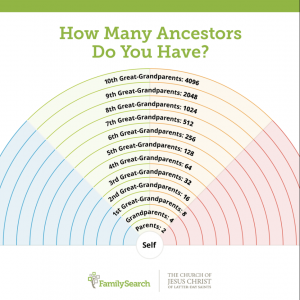



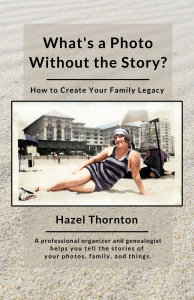
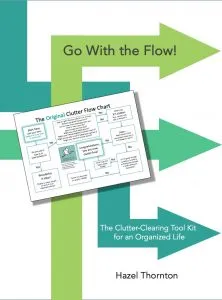
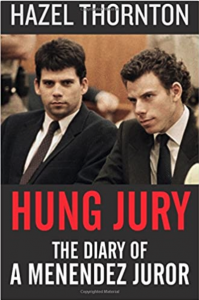
One of the things I love about this post is that it shows that things we thought were true in the past may not be so. As we learn more, we realize that it’s important to keep an open mind.
I have some of my genealogy that other members of my family have done, and I find it interesting. And I know that it is no way complete.
Thanks for sharing.
For sure in genealogy we need to take family stories with a grain of salt. It’s fun to dive in and prove (or disprove) things people have believed for years! Thanks for your comment, Jonda!
I believe I qualify to join the United Empire Loyalists’ Association of Canada and Daughters of the American Revolution, but I haven’t really looked into either one. I always appreciate your insight!
Ooh! That reminds me, I was going to look for a Loyalist society and forgot! Since one of my ancestors was a U.S. Loyalist who was evacuated to, and died in, Nova Scotia maybe I, too, qualify for the United Empire Loyalists’ Association of Canada. Who knows? Thanks for chiming in, Janet.
I always enjoy your genealogy-related posts, Hazel!
Thanks, Janet!
I’m not aware of belonging to any special societies or groups. My family is a mish-mash, mostly from northern Europe. My new son-in-law is part of the Chickasaw tribe in Oklahoma. When he visited we were able to visit the Mashantucket Pequot museum and learn more about the native Americans in Connecticut. My family has also visited the Jamestown settlement. One of the perks of living on the East coast, I guess!
I’m in tears after watching the DNA Journey movie. WOW! I didn’t expect that.
With all the disconnection and vitriol these days, what a beautiful way to think about the ways we are connected, and what we have in common.
Thank you for that, Hazel.
Oh, I’m so glad you watched the video! It contains a powerful message.
Growing up in New York State, Indigenous/Native American history was part of the curriculum throughout elementary school and middle school. A lot of it is hazy now, but I remember learning about the Iroquois Confederation, the matrilineal nature of their society, the long houses in which they lived, and the democratic manner in which they governed.
In kindergarten, we were told the fairytale of the first Thanksgiving, and about the Pilgrims, but in Social Studies through the years, the white washing was scraped away. We also learned about all of the explorers who came to North America before Columbus, and we were told not only that he didn’t discover America, or make it to the mainland, but that he was treacherous.
I understand the instinct to glorify certain people, but we can never forget that it’s the winners who get to write history, and the winners are not necessarily the good guys. 🤷♀️
None of my ancestors made it here before the late 19th century, and they were all escaping pogroms; I’m only a second and third generation American— so I don’t qualify for any societies. I was raised on Schoolhouse Rock’s videos like the “Great American Melting Pot,” but we know that even that was reductionist. You rock for raising consciousness, because it is still so very needed.
The guy who blurted out, “I’m more important than you.” I felt like saying, “Every three year old believes that. Most of us learn either to soften that belief or at least not to say it out loud.”
Right?! (You are, of course, referring to the video, and not to anything I wrote. For those readers of comments who have not watched the video.)
It’s fascinating how history changes when we look at it through different lenses. I appreciate how this post encourages readers to think more deeply about where we come from and how those stories shape us.
Thank you for your comment, Olivia!
Really appreciated this perspective. Immigration is such an important part of many people’s stories, and I like how this highlights both challenges and contributions.